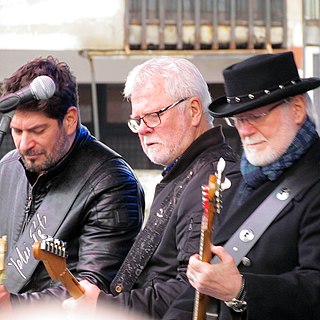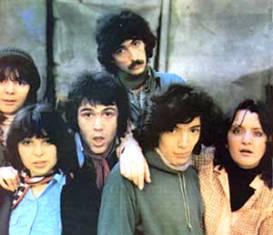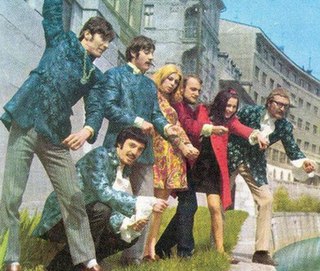
Time was a Yugoslav rock band formed in Zagreb in 1971. They were one of the most prominent acts of the 1970s Yugoslav rock scene.
New wave in Yugoslavia was the new wave music scene of the Socialist Federal Republic of Yugoslavia. As its counterparts, the British and the American new wave, from which the main influences came, the Yugoslav scene was also closely related to punk rock, ska, reggae, 2 Tone, power pop and mod revival. Some of its acts are also counted as belonging to the Yugoslav punk scene which already existed prior to new wave. Such artists were labeled as both punk rock and new wave.

YU Grupa is a Serbian rock band. A pioneer in combining rock music with the elements of the traditional music of the Balkans, YU Grupa is credited with being the longest-lasting Serbian rock band.
Pomaranča, signed as Orange on their English language releases, is a Slovenian and Yugoslav heavy metal band formed in Ljubljana in 1978. The band was one of the most notable acts of the Yugoslav heavy metal scene.

Suncokret was a Yugoslav acoustic rock band from Belgrade.

Dorian Gray was a 1980s Yugoslav music group which achieved great prominence in the former Yugoslav rock scene for its artistic and extravagant style and stage performances. It was led by Massimo Savić, who later started a successful solo career. It should not be confused with the short-lived 1970s German band of the same name.

Dah was a Yugoslav and later Belgian progressive rock band formed in Belgrade in 1972.

Sanjalice were a Yugoslav rock band formed in Belgrade in 1964. Sanjalice are notable for being one of the pioneers of the Yugoslav rock scene, as well as one of the first Yugoslav all-female bands.

San was a Yugoslav rock band formed in Belgrade in 1971. San was formed by the composer Aleksandar "Sanja" Ilić. It disbanded in 1975, after the band's vocalist Predrag Jovičić died in concert from an electric shock.

September was a Slovenian and Yugoslav rock band formed in Ljubljana in 1975.
Ritam was a Yugoslav music magazine. Prior to the appearance of Ritam, there were Yugoslav magazines dedicated to jazz, but Ritam, founded in 1962, was the first Yugoslav magazine which dealt with jazz as well as rock and pop music, thus paving the way for Yugoslav rock magazines like Džuboks and Pop Express.
BOOM Festival was a rock music festival held annually throughout SFR Yugoslavia between 1971 and 1978. The festival was held for the first time in 1971 in Maribor and for the last time in 1978 in Novi Sad. The festival featured numerous prominent acts of the Yugoslav rock scene, and five various artists live albums were recorded on various editions of the festival. Most of the editions of the festival were sponsored by the League of Socialist Youth of Yugoslavia.

Bele Vrane were a Yugoslav rock band formed in Ljubljana in 1966.

Zdenka Kovačiček is a Croatian jazz and rock vocalist. She remains one of the most prominent musicians on the Croatian music scene.

Plamenih 5 were a Yugoslav rock band formed in Belgrade in 1964. Despite having no official releases, the band are notable as one of the pioneers of the Yugoslav rock scene.

Dogovor iz 1804. was a Yugoslav rock band formed in Belgrade in 1968. Although short-lived, the band is notable as one of the pioneers of the Yugoslav progressive and psychedelic rock scenes.

Crveni Koralji were a Croatian and Yugoslav rock band formed in Zagreb in 1962. They were one of the pioneers of the Yugoslav rock scene.
Delfini were a Yugoslav band formed in Split in 1963. They were one of the pioneers of the Yugoslav rock scene.

Hobo was a Yugoslav progressive rock band formed in Zagreb in 1972. Formed and led by keyboardist Mato Došen, Hobo was a prominent act of the 1970s Yugoslav rock scene.

Jutro was a Yugoslav rock band formed in Ljubljana in 1970. Initially performing boogie rock and later turning towards jazz rock, Jutro was a prominent act on the Yugoslav rock scene in the 1970s.















